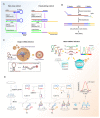Advances of Exosomal miRNAs in Breast Cancer Progression and Diagnosis
- PMID: 34829498
- PMCID: PMC8622700
- DOI: 10.3390/diagnostics11112151
Advances of Exosomal miRNAs in Breast Cancer Progression and Diagnosis
Abstract
Breast cancer is one of the most commonly diagnosed malignancies and the leading cause of cancer death in women worldwide. Although many factors associated with breast cancer have been identified, the definite etiology of breast cancer is still unclear. In addition, early diagnosis of breast cancer remains challenging. Exosomes are membrane-bound nanovesicles secreted by most types of cells and contain a series of biologically important molecules, such as lipids, proteins, and miRNAs, etc. Emerging evidence shows that exosomes can affect the status of cells by transmitting substances and messages among cells and are involved in various physiological and pathological processes. In breast cancer, exosomes play a significant role in breast tumorigenesis and progression through transfer miRNAs which can be potential biomarkers for early diagnosis of breast cancer. This review discusses the potential utility of exosomal miRNAs in breast cancer progression such as tumorigenesis, metastasis, immune regulation and drug resistance, and further in breast cancer diagnosis.
Keywords: breast cancer; diagnosis; exosome; miRNAs; potential biomarkers.
Conflict of interest statement
The authors declare no conflict of interest.
Figures


Similar articles
-
The Emerging Roles of Exosomal miRNAs in Breast Cancer Progression and Potential Clinical Applications.Breast Cancer (Dove Med Press). 2023 Nov 16;15:825-840. doi: 10.2147/BCTT.S432750. eCollection 2023. Breast Cancer (Dove Med Press). 2023. PMID: 38020052 Free PMC article. Review.
-
Emerging Function and Clinical Values of Exosomal MicroRNAs in Cancer.Mol Ther Nucleic Acids. 2019 Jun 7;16:791-804. doi: 10.1016/j.omtn.2019.04.027. Epub 2019 May 15. Mol Ther Nucleic Acids. 2019. PMID: 31163321 Free PMC article. Review.
-
Exosomes and exosomal RNAs in breast cancer: A status update.Eur J Cancer. 2021 Feb;144:252-268. doi: 10.1016/j.ejca.2020.11.033. Epub 2020 Dec 26. Eur J Cancer. 2021. PMID: 33373870 Review.
-
Exosomal microRNA: a novel biomarker for breast cancer.Biomark Med. 2018 Feb;12(2):177-188. doi: 10.2217/bmm-2017-0305. Epub 2017 Nov 20. Biomark Med. 2018. PMID: 29151358 Review.
-
Exosomal miRNAs as novel cancer biomarkers: Challenges and opportunities.J Cell Physiol. 2018 Sep;233(9):6370-6380. doi: 10.1002/jcp.26481. Epub 2018 Mar 25. J Cell Physiol. 2018. PMID: 29323722 Review.
Cited by
-
Non-Coding RNAs Modulating Estrogen Signaling and Response to Endocrine Therapy in Breast Cancer.Cancers (Basel). 2023 Mar 7;15(6):1632. doi: 10.3390/cancers15061632. Cancers (Basel). 2023. PMID: 36980520 Free PMC article. Review.
-
The Role of MicroRNAs in Breast Cancer and the Challenges of Their Clinical Application.Diagnostics (Basel). 2023 Sep 28;13(19):3072. doi: 10.3390/diagnostics13193072. Diagnostics (Basel). 2023. PMID: 37835815 Free PMC article. Review.
-
Oxidative-Induced Angiogenesis Is Modulated by Small Extracellular Vesicle miR-302a-3p Cargo in Retinal Pigment Epithelium Cells.Antioxidants (Basel). 2022 Apr 22;11(5):818. doi: 10.3390/antiox11050818. Antioxidants (Basel). 2022. PMID: 35624680 Free PMC article.
-
Harnessing cancer stem cell-derived exosomes to improve cancer therapy.J Exp Clin Cancer Res. 2023 May 23;42(1):131. doi: 10.1186/s13046-023-02717-x. J Exp Clin Cancer Res. 2023. PMID: 37217932 Free PMC article. Review.
-
Exosomes Secreted by Wharton's Jelly-Derived Mesenchymal Stem Cells Promote the Ability of Cell Proliferation and Migration for Keratinocyte.Int J Mol Sci. 2024 Apr 26;25(9):4758. doi: 10.3390/ijms25094758. Int J Mol Sci. 2024. PMID: 38731977 Free PMC article.
References
Publication types
Grants and funding
- 2017YFB0405404/National Key R&D Program of China
- XDA16020900, XDB29050301, XDB32030200/Strategic Priority Research Program of the Chinese Academy of Sciences, Grant
- 202003AD150009/National Nature Science Foundation of China
- 2019M66065/China Postdoctoral Science Foundation
- DICP1201934/Innovation Program of Science and Research from DICP, CAS
LinkOut - more resources
Full Text Sources

